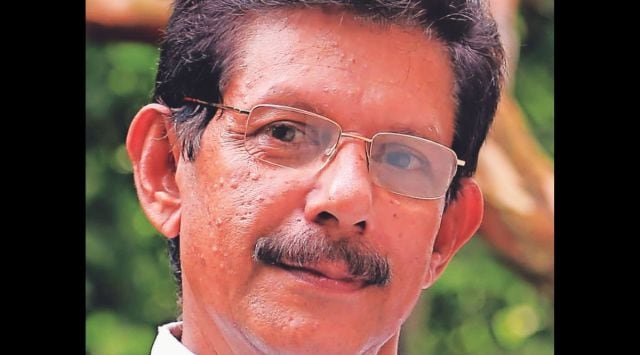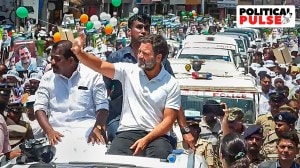- India
- International
Nothing left to lose, be scared of: Prof whose wrist was severed by PFI men
On July 4, 2010, Joseph, an Associate Professor and Head of Department of Malayalam at Newman College in Idukki, Kerala, was the target of one of the most vicious attacks by members of the Popular Front of India (PFI) -- 13 of them were convicted by a court.
 Professor T J Joseph
Professor T J JosephTHE drive back home from Sunday Mass. Jokes in the car over the “fashionable woman” walking down the rain-dappled road. Screeching of tyres. Men bursting out of a Maruti van. Their swinging axe. His mother’s helpless, hopeless whimper as she crouched in the passenger seat. Him being dragged on to the road. And then, repeated blows of the axe — over and over again. His wrist severed.
Over the last decade and more, T J Joseph has relived these moments endlessly. On July 4, 2010, Joseph, an Associate Professor and Head of Department of Malayalam at Newman College in Idukki, Kerala, was the target of one of the most vicious attacks by members of the Popular Front of India (PFI) — 13 of them were convicted by a court. The PFI alleged that a question he had set in an exam was derogatory to Islam.
With the Centre banning the PFI, for Joseph, it’s as if those endless reels are slowing down.
Speaking to The Indian Express from his home in Ernakulam, he says: “I have sought a ban on the PFI several times. There’s no doubt that this is a terrorist organisation that kills, terrorises, that aims to establish an Islamic reign. For me, personally, it’s like when you are watching or playing a sport. The passion is only while the game is on. Now it’s over. That battle is over.”
It has been a long fight for Joseph, one that began with a question on punctuation marks, for which Joseph used an excerpt from an essay by P T Kunju Muhammed. As the row over the question deepened, Joseph went into hiding, his son spent three harrowing days in police custody, angry mobs came after him, and the college management, the Catholic Diocese of Kothamangalam, caved in to pressure and suspended Joseph from service.

Then came the attack. On July 4, while driving home with his sister and mother from the local church, Joseph’s car was waylaid by a gang metres away from his house. After bursting a crude bomb, they pulled Joseph out of the car and hacked repeatedly at him – his leg, his left palm, and as one of the attackers pointed out that it was the “wrong hand”, they turned to the right palm. After a series of blows, his right palm lay severed.
In his autobiography, ‘Attupokatha Ormakal (Unsevered Memories)’, which won him the Kerala Sahitya Akademi Award this year, Joseph recalls the attack in chilling detail.
“The axe-wielder lifted my lifeless left hand, and… brought down the axe on it with brute force. It struck my wrist at an angle, slid towards my palm and nearly took off my last three fingers — they hung from my hand as if held by some invisible strings… In the meanwhile, the second chopper-wielder took my right forearm — covered in gashes — by the elbow and placed it flat on the road. The axe-man swung the axe twice at an angle, hacking my forearm in two places… Then they rained a series of blows at my wrist and severed my palm totally from my arm,” reads the English translation of his book, “A Thousand Cuts,” published by Penguin Random House India in September 2021.
The severed palm was later recovered from a neighbour’s yard, where his attackers had flung it, and reattached to his wrist in a long-drawn surgical procedure at a Kochi hospital.
While Joseph was recovering from the intense physical and emotional trauma, the college management dismissed the professor. “We were shattered. I was the only earning member then. My children were still studying – my son for his MBA and my daughter was doing her BSc in Nursing. We went through some terrible times,” he says.
But more tragedy was to follow. After a long hospital stay and multiple surgeries, followed by a painstaking recovery process, just as Joseph was gradually putting his life together, came the harshest of blows.
On March 19, 2014, Joseph’s wife Salomi, who had nursed him after the attack, killed herself – driven to deep depression following the sudden turn in their lives.
“I was the saddest then. I wasn’t sad when my hand was chopped off. That was like a yuddham (battle). But my wife’s death and the loss of my job… those were the saddest moments of my life,” says Joseph.
Eventually, the college management, which until then had steadfastly refused to revoke the suspension, reappointed Joseph following a public outcry – a day before his retirement.
For the battle-weary professor, the scars run deep. The fingers on his right palm don’t move beyond a slight curl. “I can’t do much with it. I can’t lift small things, though I can move some of the bigger ones around. For instance, I can lift a chair, I can’t hold a pen. On my left hand, I can only move my thumb and index finger. That’s how I started writing with my left hand — I wrote entire books that way,” he says.
Joseph, now the author of three books, including Branthanu Stuti (Salutations to the Madman) that was published earlier this year, says that it was all the writing and reading that he did in the years that followed the attack and his wife’s death that kept his afloat. “I need to read and write to keep my mind busy,” he says.
Meanwhile, the assault case against him drags on. Of the 31 accused who stood trial, 13 were convicted by an NIA special court and sentenced to eight years of rigorous imprisonment. The trial is on in the case of a few others who surrendered later. The main accused in the case, Savad, is still at large.
Is he scared? “Even when everything was going wrong for me, I wasn’t scared. Now, I have nothing left to lose, nothing to be scared of.”
Apr 24: Latest News
- 01
- 02
- 03
- 04
- 05







































